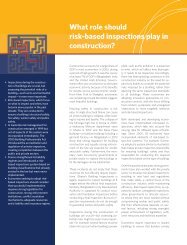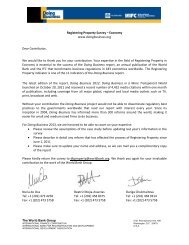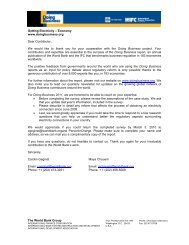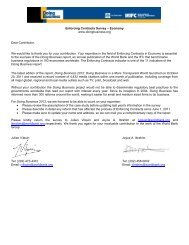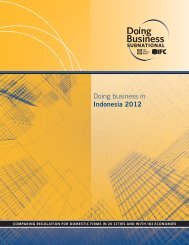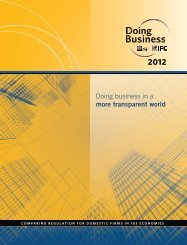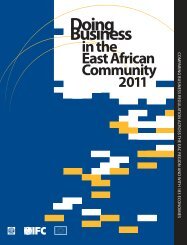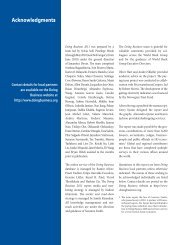Economy Profile: Burundi - Doing Business
Economy Profile: Burundi - Doing Business
Economy Profile: Burundi - Doing Business
Create successful ePaper yourself
Turn your PDF publications into a flip-book with our unique Google optimized e-Paper software.
<strong>Doing</strong> <strong>Business</strong> 2013<br />
<strong>Burundi</strong><br />
112<br />
the employing workers and getting electricity<br />
indicators) by any economy since 2005. In starting a<br />
business, for example, New Zealand has achieved the<br />
highest performance on the time (1 day), Canada and<br />
New Zealand on the number of procedures required<br />
(1), Slovenia on the cost (0% of income per capita) and<br />
Australia and 90 other economies on the paid-in<br />
minimum capital requirement (0% of income per<br />
capita). Calculating the distance to frontier for each<br />
economy involves 2 main steps. First, individual<br />
indicator scores are normalized to a common unit:<br />
except for the total tax rate. To do so, each of the 28<br />
component indicators y is rescaled to (max − y)/(max<br />
− min), with the minimum value (min) representing the<br />
frontier—the highest performance on that indicator<br />
across all economies since 2005. For the total tax rate,<br />
consistent with the calculation of the rankings, the<br />
frontier is defined as the total tax rate corresponding<br />
to the 15 th percentile based on the overall distribution<br />
of total tax rates for all years. Second, for each<br />
economy the scores obtained for individual indicators<br />
are aggregated through simple averaging into one<br />
distance to frontier score. An economy’s distance to<br />
frontier is indicated on a scale from 0 to 100, where 0<br />
represents the lowest performance and 100 the<br />
frontier.<br />
The difference between an economy’s distance to<br />
frontier score in 2005 and its score in 2012 illustrates<br />
the extent to which the economy has closed the gap to<br />
the frontier over time. And in any given year the score<br />
measures how far an economy is from the highest<br />
performance at that time.<br />
The maximum (max) and minimum (min) observed<br />
values are computed for the 174 economies included<br />
in the <strong>Doing</strong> <strong>Business</strong> sample since 2005 and for all<br />
years (from 2005 to 2012). The year 2005 was chosen<br />
as the baseline for the economy sample because it was<br />
the first year in which data were available for the<br />
majority of economies (a total of 174) and for all 9<br />
indicator sets included in the measure. To mitigate the<br />
effects of extreme outliers in the distributions of the<br />
rescaled data (very few economies need 694 days to<br />
complete the procedures to start a business, but many<br />
need 9 days), the maximum (max) is defined as the 95 th<br />
percentile of the pooled data for all economies and all<br />
years for each indicator. The exceptions are the getting<br />
credit, protecting investors and resolving insolvency<br />
indicators, whose construction precludes outliers.<br />
Take Ghana, which has a score of 67 on the distance to<br />
frontier measure for 2012. This score indicates that the<br />
economy is 33 percentage points away from the<br />
frontier constructed from the best performances<br />
across all economies and all years. Ghana was further<br />
from the frontier in 2005, with a score of 54. The<br />
difference between the scores shows an improvement<br />
over time.<br />
The distance to frontier measure can also be used for<br />
comparisons across economies in the same year,<br />
complementing the ease of doing business ranking.<br />
For example, Ghana stands at 64 this year in the ease<br />
of doing business ranking, while Peru, which is 29<br />
percentage points from the frontier, stands at 43.



